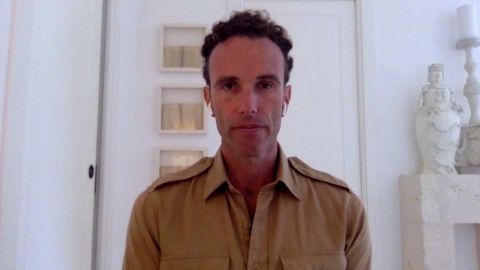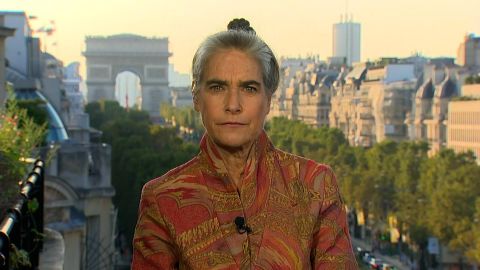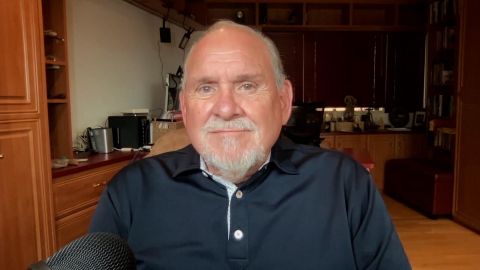Read Transcript EXPAND
CHRISTIANE AMANPOUR: And now, President Biden also wants to highlight the mental toll of war on service members and veterans. Someone who has experienced that firsthand is a former marine and best-selling author, Elliot Ackerman. He’s served five tours in Iraq and Afghanistan and he’s now helped hundreds of Afghans escape. He calls it is a Digital Dunkirk and here he is speaking to Hari Sreenivasan about how vets like him view the end of this Afghan war.
(BEGIN VIDEO CLIP)
HARI SREENIVASAN: Christiane, thanks. Elliot Ackerman, thanks for joining us. What had been happening with you and your friends who had served together with Afghans over the past few weeks and months? I mean, who are the people that served with you? What did they do and help you with? And why was that feeling so visceral for you to respond to these folks that you might not have seen in years?
ELLIOT ACKERMAN, AUTHOR AND FORMER U.S. MARINE: You know, these are my friends. I mean, these are war buddies. When I served in Afghanistan, I served exclusively as an adviser to Afghan Special Operations Units. So, when I was in battle, I looked to my left and my right, you know, there were Afghans I was fighting alongside. And in the intervening 10 years, many of them have come back — come to the United States, but they are younger brothers, their cousins, their families have aligned themselves with the former Afghan government and with our country. And, you know, these are people who basically accepted the promises that we had made them over two decades at face value and put their lives on the line to make good on those promises. So, at the end of the day, you know, you have an obligation to help these folks. And so, when you’re getting calls from someone who you fought alongside saying, you know, my brother, my cousin, you know, he cannot get out. Please, I need your help. You know, you’re going to help.
SREENIVASAN: What was their immediate fear? I mean, do they know they were on watch lists, as they saw two news of the Taliban taking over one part of the country and another city and another province?
ACKERMAN: Oh, absolutely. These people — and first of all — I mean, just the get attacked to the — kind of the granular level of it, in Afghanistan, virtually every person who worked with the United States in any capacity from a soldier to a contractor, we as the U.S. government collected their biometric data. So, there are vast databases with their, you know, fingerprints, their photos, you name it. And that biometric data is in the hands of the Taliban right now. So, these are people who cannot hide. They can’t just make a new life for themselves in Afghanistan. You know, they are marked for Taliban justice. So, these folks, obviously, just like I would, do not want to stick around and find out what Taliban justice is going to mean for them and their families.
SREENIVASAN: So, what did you and your friends decide to start doing?
ACKERMAN: Well, pretty early on in this evacuation, I started receiving phone calls about individuals organizing private flights because the government flights weren’t coming, weren’t moving quickly enough and there were private citizens who were willing to cut off the money (ph) to fly in charter aircraft. And so, we started trying to raise the money for that and started manifesting families onto these flights. We were able to get a few of those flights out. Then the conditions at the airport, at Kabul swiftly deteriorated. So, those flights became more complicated, became very difficult. You can no longer bust people into the airport really after just a few days. And so, frankly, when it started to demerited, there were some small groups of individuals we knew about and we were trying to get out, guiding them towards the various gates at the airport, whether it’s Abbey Gate, where the suicide bomb was or, you know, the North Gate was a gate where the marines were able to get some people through. And calling our contacts in the U.S. military and the intelligence community saying, you know, hey, we have a group coming to you. You know me. So, you know, the battalion commander is a colonel at the North gate. He and I went through Quantico, our training Quantico as marines together. We were in our early 20s. So, I’ve known him for years. And it was really me reaching out to him via text message saying, I hear you’re at the North Gate. He’s like, yes, I’m there. I’ve got people who need your help. OK. I’ll have my marines make sure they get in. I only bring up that personal connection because it shouldn’t have come to that. I mean, that’s great that I have a personal connection who can help these Afghans, some of whom I know, mostly whom I don’t know, get through the North Gate, but what about the tens of thousands of other Afghans who don’t have that type of connection and have worked for the U.S. So, what I was witnessing was a complete breakdown of process. There was no process. The process was try to find an American who knows somebody, and if you’re lucky, you’ll be able to get on to an airplane.
SREENIVASAN: And when you succeeded in dribs and drabs here, did words spread?
ACKERMAN: It did spread. And it spread to other folks and other networks who — of people who had Afghans who were seeking to get out. People I never knew. So, I have a whole connection of folks that I have been placed in touch. You had a group of, you know, 20 individuals here who have done human rights work who needed to get out or, you know, 30 individuals here who had done work in, you know, entertainment that they would be punished for in the Taliban. All folks who needed to get out. And, you know, the phrase a Digital Dunkirk has been thrown around, and it very much was. It was one of the sort of Dunkirkess (ph) processes where everyone is sailing cross the strait on their little boat trying to just get out whomever they can.
SREENIVASAN: What does this do to young Afghans that, you know, as you point out, I mean, if these 20 years have been this respite for them and their world view is shaped in a totally different way than under Taliban rule? And how do they perceive this exit by the United States?
ACKERMAN: I think it’s a betrayal. I mean, I think it’s a massive betrayal. And I think it’s a betrayal that will come to haunt the United States in the long run. I think it will come to haunt the United States among an entire — what I’m certain is a generation of Afghans who feel as though we have turned our backs on them and have left them behind. So, I think, you know, we’re going to be held account in that regard. I think we’re also going to be held into account with regards to our allies around the globe. I mean, this unequivocally weakens the word of the United States as a global partner and the system of, you know, relative stability that we have enjoyed as Americans over, you know, 20, 30, however far you want to go back, you can even particularly go back to after the Second World War, it’s really in the near specs (ph) been upheld this idea that, you know, America’s word, American credibility stands for something.
SREENIVASAN: This also seems like a stress test for the institution of the U.S. military. And I mean, from the things that I read, I sense disillusionment from my other veteran friends who say, well, why do we do this?
ACKERMAN: Yes, Hari. I think that’s accurate. I think there are some very strong currents of disillusion that are coursing through the military right now. You know, profess to speak for the entire U.S. military but I can just tell you what my friends are talking about who in active duty, who are veterans. And when I look back at the last 20 years for, and one of the things I think that’s singular about these wars is the way they have been waged. You know, every concept that the U.S. has fought since its inception (ph) has — haven’t have a construct to sustain it. A construct around blood and treasure. You know, how do we man these ways? How do we pay for them? All the way back to — you know, if we look at our own civil war, right? The construct was — the first ever draft come out in civil is actually the first ever income tax. The Second World War, you know, world bond drives and other draft. The Vietnam War was characterized by a very unpopular draft. Well, these wars, the post 9/11 wars have been characterized by an all- volunteer military, so that’s how we’ve done the blood. It was all volunteer. And they’ve been funded through deficit spending. So, there’s never been a war tax. We just put it on the national credit card. And that has really insulated American society from the cost of these wars. You know, unless you have a child whose volunteer or a close family member, you don’t feel them. So, in 2018, there was a Rasmussen Poll during the midterm elections. And Americans were asked, is the war in Afghanistan going on? 42 percent of Americans couldn’t even say whether or not the war in Afghanistan was still going on. That’s how disconnected we had become from these wars. Now, obviously, it’s very much in the headlines today. But I think what’s so dangerous about this is you have a U.S. military now that is increasingly become almost like a subculture, you know, a segregated cast in American society. And, you know, if we looked back through history, you know, when you have a dynamic and a democracy or you have a very large standing military and extremely dysfunctional politics at home, you know, democracies don’t last long in that environment. And I’m concerned about, as you said, you know, these currents of disillusionment or betrayal that some of the military feel, even from many of those who want the war in Afghanistan to end and are concerned, as I am, like, hey, you know, we people are dying there who were born the year that the war started. But through the same time, you feel it’s sort of the haphazard man of this was executed is very concerning and they want accountability for that. So, I think anything you see that level of dissatisfaction in our military that is isolated from the society it serves, it doesn’t seem to end well. And I think that is an issue that we as a country should be paying attention to but had paid very little attention to over the last 20 years.
SREENIVASAN: What frustrates you as a veteran? I mean, this is one campaign. This is, obviously, in our lifetime, it’s the longest one that we all can remember. But you’ve gone through your service. Are those ideals and believes that drew you in and when you see what could be, at least, a phase and outcome right now, what are you and your friends saying to each other?
ACKERMAN: Well, I would say a strain particularly in recent weeks that I have heard, that I am sympathetic and very much agree with is a call for accountability. I don’t think there’s any way to look at what just occurred in Afghanistan over the last three weeks with our withdraw and then characterize it as anything but utter debacle. And having served in the military, you know, if I was a captain and I was running a live fire range and a marine got shot on a live fire training exercise, I would be fired. I would lose my job. It would probably be a career ender for me. And we’ve just watched the senior ranks of the U.S. military preside over an absolute debacle in this withdrawal. You know, people like chairman of the Joints Chiefs of Staff, General Milley, or secretary of defense, Lloyd Austin, you know, I would — you know, the secretary of state, this has been a botched withdrawal based off of failed policies. Is accountability- (INAUDIBLE)? Will people lose their jobs over this, because they should? And if they don’t, there will be no clearer evidence that at the highest levels of the U.S. government there exists a culture of no accountability. And that just doesn’t — it just doesn’t concern me as a veteran, it also concerns me as a citizen and I think it should concern all of us as citizens. You know, we need to bring back culture of accountability here.
SREENIVASAN: Well, what when you talk about accountability, right now, it’s hard to separate that from the political lens, right? So, let’s say someone should be fired. But does that act, is that act prevented from saying, well, we don’t want the other team to score points? It’s going to look like weakness. This is going to head into the midterms. This is going to change our calculus. Et cetera, et cetera. Versus saying, you’re responsible for this. This is unacceptable. You no longer have a job here.
ACKERMAN: I totally agree. I think that’s why we should be all concerned. You know, partisanship makes dumb as Americans, it makes — it erodes the foundations of our society. It makes us Democrats and Republicans first and Americans second. And if we live in that type of society, the future of that society is dark. So, if we live if a society where there’s no accountability because accountability means that you might give the other team, the other Republican or Democratic team a win and so no one can ever be held accountable, you know, then we are really sick and we are really in a terrible place as a country.
SREENIVASAN: You know, the president has repeatedly said over the past few days, look, there is no good way, essentially, to exit this. Should we have stayed? Should we have left some sort of a presence there? Because President Biden says he doesn’t want to go into the next decade of committing U.S. soldiers to what seems like quicksand. We don’t seem to have a resolution in this process of nation building that we originally said we didn’t want to do, but we began doing.
ACKERMAN: You know, it’s very interesting. I was — as I have been thinking over these last few days, I went back and I rewatched the Secretary of State Tony Blinken’s nomination video, when he accepted President Biden’s nomination as secretarty of state. And in that, had told a story — I think it was his step great grandfather who was a Jewish in the Second World War. And at the culmination of war, he was hiding from Germans in a forest when he heard a tank. The tank rumbled past. He saw that the tank had a five-pointed white star and he tells us — Blinken tells this very moving story of his grandfather running up to the tank, dropping onto his knees and saying the only three words of English that he knew, which were God bless America. And this American tanker jumping down and whisking his grandfather away to freedom and allowing him to live the life that he’s had in his family to ascend the secretary of state. And he ended that story by saying, because that’s who we are. And that story and that sense of who we are is so divorce from the policies that President Biden seems to be pursuing right now. So, specific to your question, should we have stayed in Afghanistan? I think it begs a larger question, who are we as the United States? You know, are we a country of isolationist? Do we receive (ph) within our borders when we come to people and tell them that, you know, we are your allies in pursuing a free and a democratic nation, we’ll stand by you, does that mean something? So, I think, you know, when we look at Afghanistan, you know, Afghanistan in 2009, 2010, 2011, when I served there is a very different place than it was in 2017 and 2018, kind of in the years where our withdrawal and draw down began. When I was there, there were 150,000 U.S. troops in Afghanistan and we’re fully engaged in combat operations. By 2018, you know, we had a little over 10,000 troops in Afghanistan. The Afghan National Army greatly increased. Yes, they were actively fighting against the Taliban, but it was a war that they were by and large fighting and that we were doing a good job helping them fight. So, I believe there are many models that would have been more beneficial to the United States long-term interests than the model we just executed, which was, you know, a botched withdrawal and here’s hoping that Afghanistan turns out for the best. So, I think if Afghanistan, I think, the course we pursued is cynical. If you look at, you know, who we are, I don’t believe is aligned with at least what, in my adult lifetime, has been our American values. And I think in the long-term, it’s going to be more costly for us than had we kept a (INAUDIBLE) force presence there and try to keep working with the Afghan government.
SREENIVASAN: Elliot Ackerman, author and marine veteran, thanks so much for joining us.
ACKERMAN: Thanks for having me.
About This Episode EXPAND
Former U.S. military adviser Sarah Chayes discusses the United States’ withdrawal from Afghanistan. Ambassador Maleeha Lodhi explains what’s at stake in Pakistan if Afghanistan descends into chaos. Epidemiologist Larry Brilliant discusses the emergence of a new COVID-19 variant first seen in Colombia. Author and former U.S. marine Elliot Ackerman joins the program.
LEARN MORE



